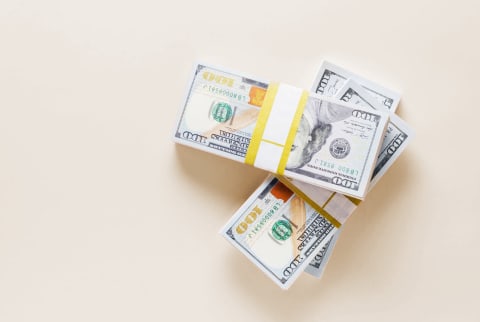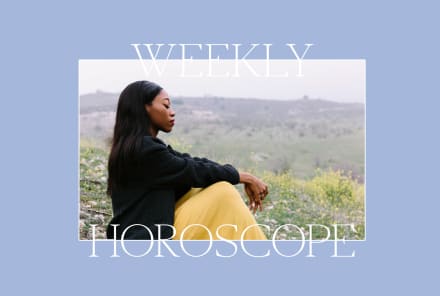Advertisement
Why Paying Back $30,000 Debt Was The Best Thing I've Ever Done For My Health


If you've ever been in debt, you know how debilitating it can feel. In my teens and early 20s, I filled countless journal pages with my worries about bills and credit card debt. It was all-consuming.
As so many people do, I leaned on unhealthy habits to cope with my stress: I skipped workouts for happy hours, ate all the salty food I could get my hands on, and I woke up tired every morning because I couldn’t fall asleep the night before. I had headaches almost constantly, and I was sick All. Of. The. Time. In short: I felt like a mess.
The day I discovered my (less-than-great) credit score at the age of 23 was when I decided to really focus on my finances. That number made me recognize how exhausted I was from worrying about money and how much I needed a change for the sake of my health. Here's how I got started.
My plan for paying off $30,000 in debt.
Step 1: I faced my numbers.
This is probably the most painful step in the whole process. And since it's the first one, it's often why so many individuals just keep putting off thinking about their financial wellness.
Most of us conveniently underestimate how much we owe. For me...it was bad. I hadn't quite realized that my 10 credit cards totaled to $30k in debt. I also had about $20k in student loans. The fact that I barely earned $30k a year at my full-time job made these numbers even harder to swallow. I was definitely living a Champagne life on a lemonade budget (wait, I didn't even have a budget), and frankly, it was all on me. I had gotten myself into debt, so I was going to have to be the one to pull myself out.
So much of our money stress stems from not knowing.
For me, ripping the Band-Aid off and taking responsibility meant grabbing a piece of paper and writing down the following for every debt: type of debt (credit card or loan), percentage rate of interest, credit limit, how much is owed, the minimum payment, and how much was paid in interest last month.
Seeing everything on one page immediately made me feel more relieved. So much of our money stress stems from not knowing. Yes, that number might be overwhelming, but you KNOW the number, and knowledge is power in the debt game.
Step 2: I figured out how much money I needed each month to survive and stay good on my credit.
At the time, I didn't have any type of budget for necessities like food and rent. You need to know this number, always. Start by creating a basic outline of how much you can afford to spend each month while paying your minimum debt payments. This may not help you pay off debt in a speedy fashion, but you have to start somewhere. Your credit score is comprised of several things, but the bulk of your score (35 percent) is determined by you paying the minimum payment on your debts on time.
I focused on the debt on my credit cards first because their interest rates were double, sometimes triple, those of my student loans. Once I paid that first card off, I added that payment to the next card in line and so on. Ideally, you aren’t actively using your credit cards as you are paying them off. I knew that I had a weakness for whipping mine out, so I went so far as to not just leave them at home, but put them in a cup of water and freeze them. Whatever works!
Step 3: I kept on top of the numbers.
Once I knew how much money I needed each month to live and start to pay off debt, I could figure out what I had left over. Even when I was still dealing with a ton of debt, just knowing that I knew all of my numbers and had a plan in place was a huge weight off my shoulders.
I started to feel more optimistic, and naturally, I started to take better care of myself. In time, I started buying better food and investing in my health a bit more too. I felt healthier financially, and this translated to wanted to feel better physically too.
How this basic budget ultimately saved me a lot of pain.
Then came the plot twist: Halfway through paying off my credit cards, at the age of 24, I was thrown a curveball when I was diagnosed with metastatic thyroid cancer. I was fortunate enough to have great health insurance through my job, but I still had to pay some bills on my own. But I can honestly say that having a budget and a plan allowed me to navigate these unexpected expenses and incorporate my new monthly prescription costs with ease.
Moral of this story: Taking care of your financial health can translate to your overall health too. In my mind, it should be one of our biggest priorities.
Watch Next
Enjoy some of our favorite clips from classes
Enjoy some of our favorite clips from classes
What Is Meditation?
Mindfulness/Spirituality | Light Watkins
Box Breathing
Mindfulness/Spirituality | Gwen Dittmar
What Breathwork Can Address
Mindfulness/Spirituality | Gwen Dittmar
The 8 Limbs of Yoga - What is Asana?
Yoga | Caley Alyssa
Two Standing Postures to Open Up Tight Hips
Yoga | Caley Alyssa
How Plants Can Optimize Athletic Performance
Nutrition | Rich Roll
What to Eat Before a Workout
Nutrition | Rich Roll
How Ayurveda Helps Us Navigate Modern Life
Nutrition | Sahara Rose
Messages About Love & Relationships
Love & Relationships | Esther Perel
Love Languages
Love & Relationships | Esther Perel

















